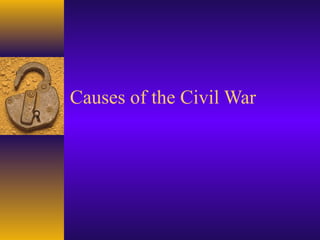
Causes of the Civil War Review
- 1. Causes of the Civil War
- 2. Invention of the Cotton Gin ♦ When: 1793 ♦ Who: Eli Whitney: ♦ Where: South ♦ What: Invention to remove seeds from cotton
- 3. Invention of the Cotton Gin ♦ Effect: – drastically increased the amount of cotton being produced, thus drastically increasing the number of slaves needed to harvest the cotton. – This increased the tensions that slavery caused.
- 4. Missouri Compromise ♦ When: 1820 ♦ Who: Politicians ♦ Where: New states (Missouri and Maine) ♦ What: Political compromise made in 1820 between Northern and Southern politicians
- 5. Missouri Compromise ♦ Effect: – Admitted Missouri as slave state, Maine as free state, prohibited slavery north of 36°30’ parallel (Missouri Compromise Line) – Kept power in Senate equal
- 6. Compromise of 1850 ♦ When: 1850 ♦ Who: Congress ♦ Where: New Lands gained by the Mexican Cession ♦ What: – Congressional agreement on slavery: • admitted California as a free state • did not restrict slavery in New Mexico or Utah (popular sovereignty ) • Bans slave trade in Washington, D.C. • passed a stricter fugitive slave law, which said that all persons must help to catch fugitive slaves
- 7. Compromise of 1850 ♦ Effect: – upset North because it allowed slavery above old Missouri Compromise line, basically negating the Missouri Compromise – Southerners loved it for the same reason – Did not solve slavery issue – Caused sectional tensions
- 8. Uncle Tom’s Cabin ♦ When: 1852 ♦ Who: Written by Harriet Beecher Stowe, who had never been to the South ♦ Where: North ♦ What: Fictional book about slavery in South
- 9. Uncle Tom’s Cabin ♦ Effect: – Turned slavery from a political issue to a moral issue! – Enraged & disgusted Northerners about slavery & the South – Enraged Southerners who felt it was an unfair description of slavery – Caused sectional tensions to heat up even more
- 10. Kansas-Nebraska Act ♦ When:1854 ♦ Who: Politicians ♦ Where: Kansas-Nebraska territory ♦ What: – law that repealed Missouri Compromise – split the Nebraska territory into 2 separate territories, Kansas and Nebraska – declared issue of slavery in Kansas and Nebraska territories would be left to residents (popular sovereignty)
- 11. Kansas-Nebraska Act ♦ Effect: – Bloody Kansas • Violence broke out in Kansas in the late 1850’s between the pro-slavery and anti-slavery factions • Eventually 2 separate gvn’ts were elected in Kansas, one pro, one con of slavery – It was a warm-up exercise for the coming Civil War
- 12. Dred Scott Decision ♦ When: 1857 ♦ Who: Supreme Court ♦ Where: Illinois ♦ What: – Supreme Court case that decided slaves did not have the rights of citizens – Ruled Congress could not forbid slavery in the territories, making Missouri Compromise unconstitutional
- 13. Dred Scott Decision ♦ Effect: – Opened slavery to new territories – South loved it, but North hated it – Sectional tensions escalated.
- 14. Lincoln-Douglas Debates ♦ When: 1858 ♦ Who: Abraham Lincoln and Stephen Douglas ♦ Where: Illinois ♦ What: – Series of debates between Stephen Douglas & Abraham Lincoln during 1858 senatorial election campaign – Focused on issue of slavery
- 15. Lincoln-Douglas Debates ♦ Effect: – Lincoln got Douglas to admit that popular sovereignty could be used to prevent the expansion of slavery into territories, which lost Douglas the support of the South – South became aware of Lincoln’s views.
- 16. John Brown’s Raid ♦ When: 1859 ♦ Who: John Brown, an abolitionist ♦ Where: Harper’s Ferry, Virginia ♦ What: – Tried to capture arsenal at Harper’s Ferry, Virginia, and begin slave revolt – Was captured and hung
- 17. John Brown’s Raid ♦ Effect: – Made a martyr for Union (North) and abolitionist cause – Southerners horrified/disgusted by North’s outright support of Brown’s actions – sectional tension intensified
- 18. Election of 1860 ♦ When: 1860 ♦ Who: Lincoln, Douglas, Bell, Breckinridge ♦ Where: United States ♦ What: Lincoln (viewed by the South as an abolitionist) was elected president
- 19. Election of 1860 ♦ Effect: – Showed split in the nation over slavery – Southern states seceded after hearing of Lincoln’s win – Feared they would lose slavery under his rule – Caused North to take military measures to keep Union together – Set stage for Fort Sumter attack and start of war.
- 20. Sectional Tension ♦ The people in the Northern states and Southern states became more and more politically, socially, and economically divided.
- 21. Sectional Tension ♦ The cotton gin caused the Southern states to follow its agricultural ways, while the Northern states became more industrialized (they could not grow cotton in the North - too cold) ♦ Northern and Southern states found it increasingly difficult to relate to one another, especially when it came to the topic of slavery ♦ They began to see themselves as separate “sections” of the nation - sections which had very little in common
- 22. Sectional Tension ♦ Several compromises were attempted by both sides to try and overcome the problems between them regarding the slavery issue ♦ All compromises eventually failed ♦ The result would be the build-up of sectional tensions which would eventually lead to war